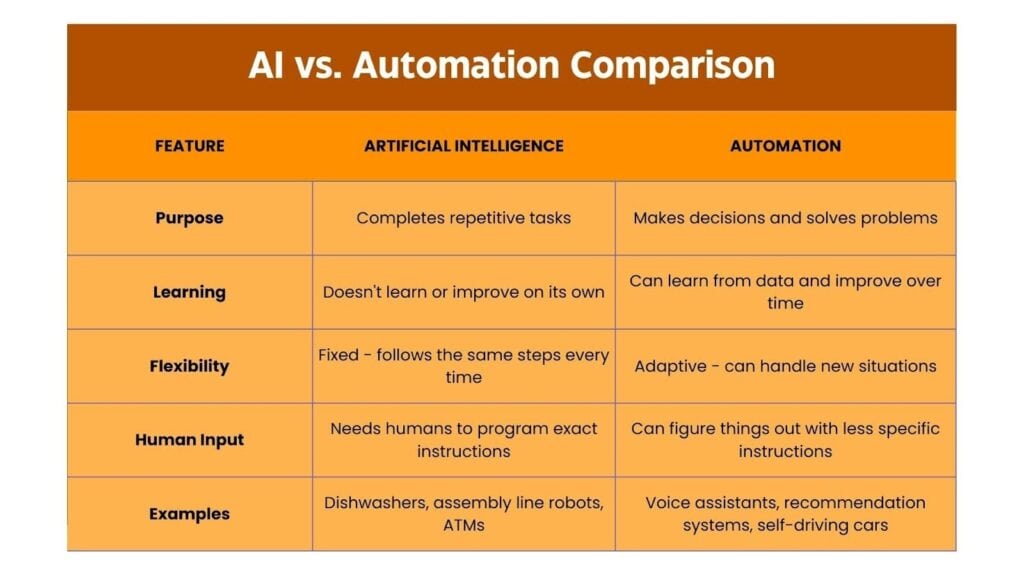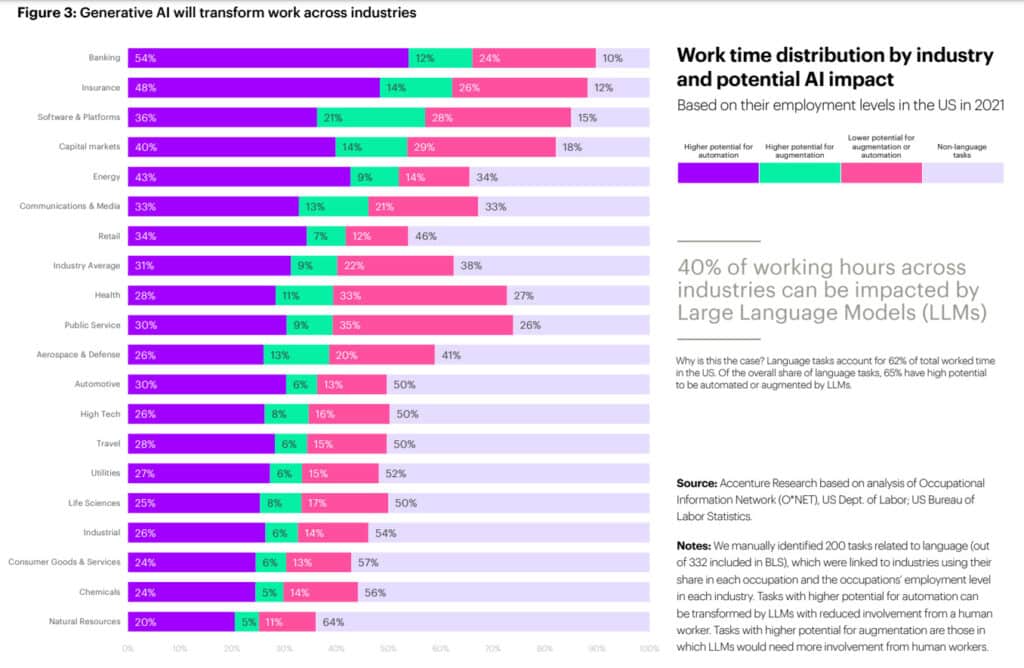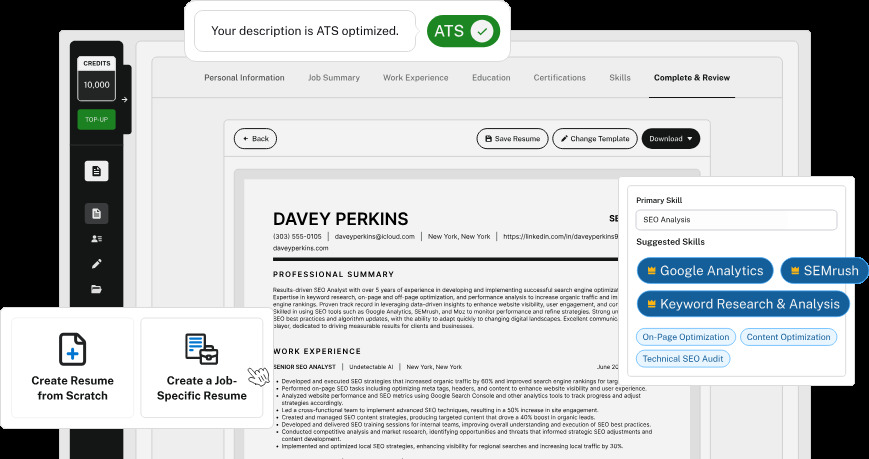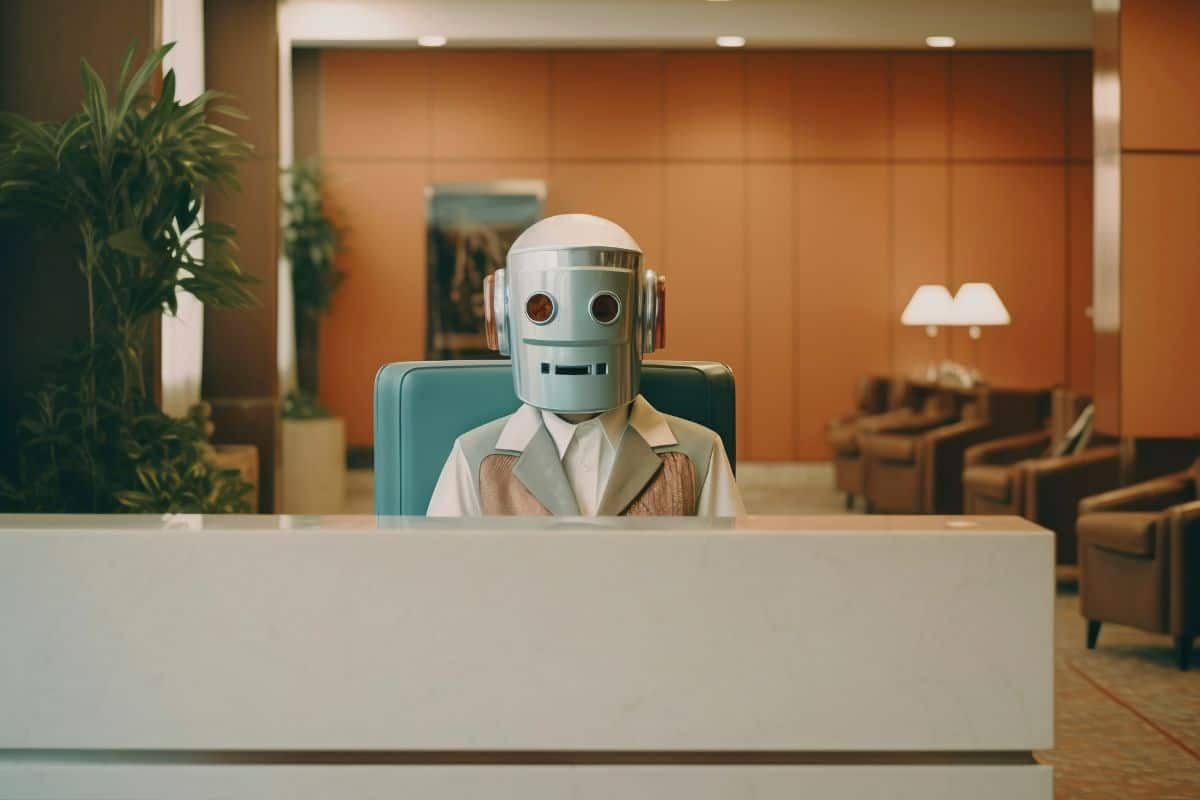In 2020, data predicted that machines and AI would replace around 85 million jobs by 2025.
Well, it’s 2025 now – has AI taken your job yet?
The predictions were (somewhat) right. AI has definitely changed the job market, but it doesn’t mean that work is wiped out.
Many traditional roles now use AI to ease their task and save time.
For example,
Copywriters now work with AI-assisted content tools.
Doctors use AI-assisted medical documentation.
Financial analysts rely on AI-driven insights. Cybersecurity detects threats with AI’s help.
Natural intelligence (humans) plus artificial intelligence (machines) beat either one alone.
Humans have adapted through the industrial revolution, computer, internet, and mobile revolution – AI is no different.
We just need to understand that closing your eyes won’t make the danger go away.
Instead, we need to look the future in the eye and learn to ride this wave instead of being crushed by it.
This guide will show you which jobs AI might take over, which jobs are growing, and how to make AI work for you instead of against you.
How AI Is Changing the Job Market
AI is changing the job market in both good and bad ways.
Let’s talk about the good stuff first…
- The NHS uses $1-per-scan AI tools to catch the 10% of fractures doctors miss. (AI saves time and cost)
- Symani Surgical System gives surgeons superhuman precision across 1,000+ European procedures. (AI ensures accuracy)
- Standard Bots’ robot arms learn by watching humans in the factories and handling their repetitive tasks. (AI saves energy)
You might have seen this pattern before.


Never Worry About AI Detecting Your Texts Again. Undetectable AI Can Help You:
- Make your AI assisted writing appear human-like.
- Bypass all major AI detection tools with just one click.
- Use AI safely and confidently in school and work.
During the Computer Revolution (1972-2010), US manufacturing jobs dropped from 17.5M to 11.5M, but production actually increased by 270%.
Different jobs, more output.
But there’s a downside for people who don’t upskill at the right time.
McKinsey predicted that BY 2030, AI could replace:
- 70% of manufacturing tasks
- 60% of banking operations
- 80% of jobs in transportation/warehousing.
What does this mean?
Mid-career professionals are going to face difficult transitions when specialized roles become obsolete.
That’s why it’s essential to prepare AI-trained skilled workers for the future.
This is what this partnership will look like.
- Human Input + AI = 5X Output (Byproduct = Time, Energy, Cost)
The future isn’t humans VERSUS machines, it’s humans AND machines.
The Role of AI & Automation in the Workforce
Before going into the details, let’s get one thing clear: AI and Automation aren’t the same.

Automation follows the set rules like calculators, spell-checkers, and even old-school thermostats.
AI, on the other hand, learns and makes decisions like ChatGPT, Claude, and DeepSeek.
And it’s everywhere.
- Construction: In Japan, AIST developed a robot called HRP-5P that autonomously performs routine tasks. (like installing drywalls)
- Healthcare: Google’s DeepMind is trained on 15,000 eye scans to recommend treatment for over 50 eye diseases with 94% accuracy.
- Surgery: In China, robot assistants help during long surgeries without getting tired or shaky. (even after 12 hours)
All of this and so much more is happening right now in 2025.
With a future full of possibilities, one thing is clear: AI is creating jobs and business opportunities.
What kind of jobs?
- Some people will ensure AI is fair and doesn’t make bad decisions.
- Others will monitor robots to make sure they’re doing their jobs right.
- Many will use AI to create art, music, and stories that never existed before.
So don’t worry, AI and automation aren’t replacing us (not anytime soon), but they’re changing how we used to work.
Why Some Jobs Are at Risk While Others Are Safe
The data entry operator might be worried about AI, but the therapist isn’t. Why?
It’s because some jobs demand uniquely human capabilities.
Imagine this,
There’s a factory floor where Joe has worked at the same spot for decades. Same spot, tightening the same bolts, day after day.
His movements are so predictable you could set your watch on them.
Then one Tuesday morning, a shiny new robotic arm appeared. By Friday, Joe was clearing out his locker.
But why Joe and not Jane, the crisis counselor down the street?
It’s all about patterns.
Jobs fall into invisible categories that determine their automation risk.
When work follows clear, repetitive patterns, there are more chances of them to be replaced.
For example, toll booth operators, assembly line workers, or basic bookkeeping.
“Do this, then this, then this. Repeat forever.”
Machines are good at following instructions without complaints, coffee breaks, or vacation times.
What chance does a human have against a machine that works 24/7 without mistakes?
None. Zero. Zilch.
But when was the last time you saw a robot comforting a child or negotiating a complex business deal?
The safest jobs are those that require what machines lack: That mysterious human spark.
Here is the simplest way to understand it…
If you can explain exactly how to do your job step by step without any “it depends” “use your judgment” or “feel it out,” then AI is eyeing your position.
But if your job involves navigating the beautiful mess of human emotions, making decisions with incomplete information, or creating something genuinely new-you have got job security that money can’t buy.
For now, at least.
Because in the end, it’s about the task it’s about the human touch.
How AI Improves Efficiency but Disrupts Employment
In the short term, AI will create problems. This is because it’s changing jobs faster than people are keeping up.
Think about history.
When machines took over farm work, people found jobs in factories.
When factory jobs disappeared, service jobs grew.
But those changes took decades. AI is moving at lightning speed at this time.
- AI is replacing jobs in weeks, while the talent is not focusing on development.
- Schools are not keeping up. By the time they update courses, AI has already changed the game.
- New jobs are not always nearby. If you lose a job in one city, the new job can be in another state and moving is not always easy.
When old jobs disappear and new ones are not ready yet, it creates a gap and this gap is called “Creative Destruction”
At the same time, companies struggle to find workers because people’s skills don’t match what’s needed.
It’s like trying to fit a square peg in a round hole – there’s work available but not enough trained workers to do it.
So what can we do about it?
We can prepare.
- Governments can help by offering job training.
- Schools need to teach how to learn Instead of just memorizing the facts.
- You can stay ahead by learning new skills yourself.
What Jobs Will AI Replace? High-Risk Careers
Let’s cut to the chase: Here are the top 5 careers that are at high risk of being replaced by AI or automation.
- Data Entry Specialists
The entire professional existence revolves around taking information from here and putting it there. It is methodical, predictable, and repetitive.
AI can do the same job 24/7, never misses a digit, and processes information at superhuman speed.
- Translators & Interpreters
Translation is fundamentally pattern recognition – exactly what AI excels at.
While literary translation with cultural nuance remains challenging for algorithms, routine business translations are increasingly AI territory.
- Paralegals & Legal Assistants
Legal AI can analyze more contracts in an afternoon than a paralegal can in a month – without getting bored or missing key details on page 394.
- Bookkeepers & Accounting Clerks
Accounting follows rules. Lots of rules. And rule-following is AI’s superpower.
The humans remaining in this field aren’t doing bookkeeping, they’re analyzing the results and providing strategic advice.
- Customer Service Representatives
“Your call is important to us” might soon be the only human voice in many customer service interactions.
AI systems now understand natural language, detect emotions, anticipate needs, and solve routine problems without human intervention. Administrative positions such as a healthcare virtual receptionist are increasingly blending AI tools with human oversight to manage scheduling, patient communication, and documentation more efficiently.
These were the top few, however, you can find a list of highly at-risk careers here: Top 12 Roles That Are At Risk of Being Replaced By AI & Other Robots
Jobs That AI Won’t Replace (Safe & Growing Careers)
Some jobs rely on uniquely human qualities that machines struggle to replicate. The top careers that will remain “robot-proof” even as AI technology advances are these:
- Healthcare Workers
Remember the time when you were sick and the nurse not only provided medical care but also offered comfort with a gentle touch and reassuring smile?
A Healthcare professional has technical expertise with human connection. A robot might take your temperature, but it can’t hold your hand when you are scared.
- Social Workers
It’s because when families face their darkest movements they need more than an algorithm taping their backs with robotic voices.
They need someone who can navigate complex emotional situations with compassion and cultural sensitivity.
- Personal Trainers
“Come on, just one more rep – I know you have got this.” The motivational psychology of a good trainer adapts to each client’s personality.
Is this client motivated by general encouragement or tough love?
A trainer watches the subtle aspects of your movement and poster and then offers you hands-on corrections that AI simply cannot provide.
- Chefs and Food Service Specialists
A chef understands not just a flavor combinations but also the emotional significance of the food.
Innovations in cuisines come from life experiences, cultural exchange, and The chef’s individual perspective – elements that AI cannot replicate authentically.
- Artists and Designers
Yes, AI can create thousands of images in seconds, but it still lacks an authentic voice that comes from lived experience.
There are paintings of the trauma survivors or indigenous designers adding traditional patterns to honor their ancestors.
This is something AI cannot replicate – the trembling hands behind the brush stroke, the emotions behind the color choices, and the social context that makes the work meaningful.
Besides the above, here’s the list of additional jobs that are at the lowest risk of being replaced by AI and automation: 65 Jobs With The Lowest Risk Of Automation by AI & Other Robots

How to Future-Proof Your Career Against AI
Take a moment to think about your own job.
Which parts are the same every day?
Do you spend a lot of time entering data, following instructions, or doing things that a machine could easily learn?
If so, those tasks could be replaced by AI.
But what about the parts of your job that require human skills? Do you make big decisions? Help people solve problems? Use creativity to come up with new ideas.
These are the things that AI can’t easily do—and they are what will keep your career safe.
Imagine your job as a pie chart.
What percentage of your work involves simple, repetitive tasks? And how much of it requires human connection, judgment, and problem-solving?
If most of your job is made up of tasks that AI can do, it’s time to add more human skills to your work.
Just like you can’t make a sandwich with only one slice of bread, you need meat, cheese, veggies, and sauce too!
Your job skills are the same way – you need different kinds to make employers want to hire you.
“But I already finished school!” you might say.
Well, in today’s world, your education is never really over. The people who succeed are the ones who never stop learning.
The job market is changing fast. Those who see learning as a daily habit instead of something they do only when necessary will have the best opportunities.
And the good news?
Learning doesn’t have to be hard! Spending just 30 minutes a day on building new skills can put you ahead of 95% of professionals.
The best part is, that you can learn in different ways:
✅ Online courses – Get certifications and structured lessons
✅ Communities of practice – Connect with others in your field
✅ Side projects – Gain real experience by trying something new
If you want to shift careers, don’t wait until you have to.
- Try small side projects in a new field
- Connect with people who already do the job you want
- Learn skills that can transfer to a different role
The best time to start was years ago. The second-best time? Right now.
How AI Can Help You Find Jobs That Are Future-Proof
AI Tool # 1 – AI Resume Builder
Resumes are the first impressions, and “First impression is the last impression.”
You need to ensure that you have selected the better keywords, no grammatical mistakes, and a format that makes it professional, and here’s where an AI Resume Builder can help.

People who use AI-optimized resumes often get more interviews – some studies show up to 40% more responses from employers. And using it is also very easy.
- Select from our collection of resume templates that suit your career goals.
- Use AI Resume Builder to tailor your resume with industry-specific keywords and expert suggestions.
- Save your resume in various formats and apply to your dream jobs with confidence. (PDF format works best for most applications.)
AI Tool # 2 – Auto Applier Tool For Faster Job Hunting Smart Applier tool lets you submit many job applications quickly, even for positions that might normally screen out automated submissions.

This tool saves you hours of time – many users report applying to 50+ jobs in the time it would take to manually apply to just 5.
- Upload your current resume and connect your LinkedIn profile.
- Customize the search criteria and set filters so the tool can be optimized to know exactly which jobs are the best fit for you.
- Auto Job Applier automates the entire job application process and will apply to the best opportunities while you sleep.
Tip: Successful job hunters combine automation with personal touches. For example, when you use an auto applier for initial applications, then follow up personally with hiring managers on LinkedIn.
Also, try our AI Detector and Humanizer in the widget below!
FAQs About AI & Job Replacement
What Jobs Will AI Replace the Fastest?
Jobs that follow the same pattern over and over are likely to be replaced by AI. This includes jobs like data entry, basic accounting, and answering simple customer questions.
The World Economic Forum says that 44% of workers will need new skills in the next 5 years because of AI.
What Are the Best Careers to Avoid AI Job Loss?
Look for careers that need human skills. These include hands-on jobs like electricians, plumbers, and construction. Creative works like being an artist, designer, and content creator. Jobs that need emotional intelligence like counselors, teachers, and coaches.
You can also adopt for careers that work with artificial intelligence instead of competing with it. Jobs like AI trainers, AI ethicists, prompt engineers, ML engineers, AI integration consultants, etc.
Will AI Take Over All Jobs?
No, AI won’t take over all jobs. While AI is changing how we work, many jobs need things robots can’t do well. Jobs that need creativity, caring for others, deep thinking, working with people face to face, or handling situations that weren’t seen before.
AI is good at tasks that follow clear rules or patterns. It can sort data quickly, spot things in pictures, or answer simple questions.
How Can I Make My Job AI-Proof?
Here are ways to make your job safer from AI.
1) Build skills that AI can’t copy easily.
2) Keep learning new things.
3) Work with AI instead of against it.
4) Solve tricky problems.
Look for complex challenges at work that need a human touch. AI works best with simple, clear tasks—not messy real-world problems.
Conclusion
Remember when computers first arrived in offices?
Everyone panicked, thinking jobs would disappear.
But did the World end?
Nope!
Instead, we got millions of bloggers, YouTube creators, website designers/developers, and influencers – careers that never existed before.
Now, we have more career opportunities than ever before.
AI is just another shift, like the ones before.
The future is not written in stone, it’s being shaped by both humans and AI working side by side.
Think for a second…
What if the robot revolution is not coming to replace us, but to work alongside us?
Don’t see it as machines claiming our jobs. See the new opportunities they bring for the bold and curious ones.
So, the choice is YOURS! Will you ride the AI wave with confidence or let it pull you under?
The water’s perfect today – crystal clear and full of potential.
It’s time to choose the smarter path.
